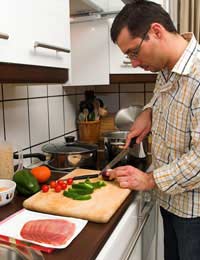Ensuring Your Loved One Maintains a Healthy Diet

When looking after a loved one who is either ill or disabled, it can appear kind to indulge them with regard to their diet. You may tell yourself that if they were able to prepare their own meals, they would only eat food that they liked. Alternatively, you may argue that their life holds few pleasures and if they enjoy eating lots of sweets and cakes or food with a high level of saturated fats, then you are not willing to deny them that satisfaction.
For someone with limited mobility who is unable to easily continue with hobbies and pastimes that were enjoyed in the past, it is easy to sit indoors, watch television and continually graze on unhealthy foods. It soon becomes a habit and a way of life. But over-eating will only add to the problems of isolation and depression that many disabled people feel. Part of your responsibilities as a carer, as well as trying to maintain your loved one’s outside interests and maintain their self-esteem, is to keep them healthy and watch what they eat. Otherwise, their diet could simply add to their poor quality of life as well as make additional problems for yourself.
What is a Good Diet?
A well-balanced diet can be achieved in many ways but often, when caring full-time for someone, trying to prepare big cooked meals two or three times a day can be overwhelming. Instead, you may prefer to offer more easily accomplished alternatives like sandwiches, fruit, cheese and biscuits.
You should aim to include food items from each of the following major food groups in each meal:
- Starch – bread, rice, cereals, potatoes.
- Fruit and vegetables.
- Meat, fish, or dairy products – cheese, yogurt, milk.
Where possible, keep processed foods, additional salt, sugar and fats to a minimum – there is already enough of these essential ingredients in the basic food.
What are the results of a Poor Diet?
A poor diet is a contributory factor to many illnesses including diabetes, heart disease and stroke. It also adds to the problems associated with high blood pressure and obesity. Arguably, diet-related illnesses cause more health problems than smoking. Whatever condition your loved one suffers from, a poor diet will only exacerbate the symptoms and perhaps shorten their lives.
A poor diet also contributes to a feeling of lethargy and can cause constipation. And if your loved one puts on a lot of weight, it will make caring for them much more difficult and possibly cause you back injury.
How can a Diet be improved?
Before making any drastic changes to diet, discuss your concerns with your doctor. A medical examination of your loved one should provide the doctor with enough information to be able to suggest suitable lifestyle and dietary alternatives. This can be a good time to re-assess their daily routine and perhaps include some additional exercise.
What about Your Diet?
Caring full-time for someone also affects your ability to continue with the life you led before. It is imperative for the welfare of your loved one as well as yourself that you remember to eat a well-balanced diet, get enough exercise and keep up with personal interests.
Remember that you can only be a good carer if you are in good shape – so don’t forget to look after yourself as well as your loved one.








